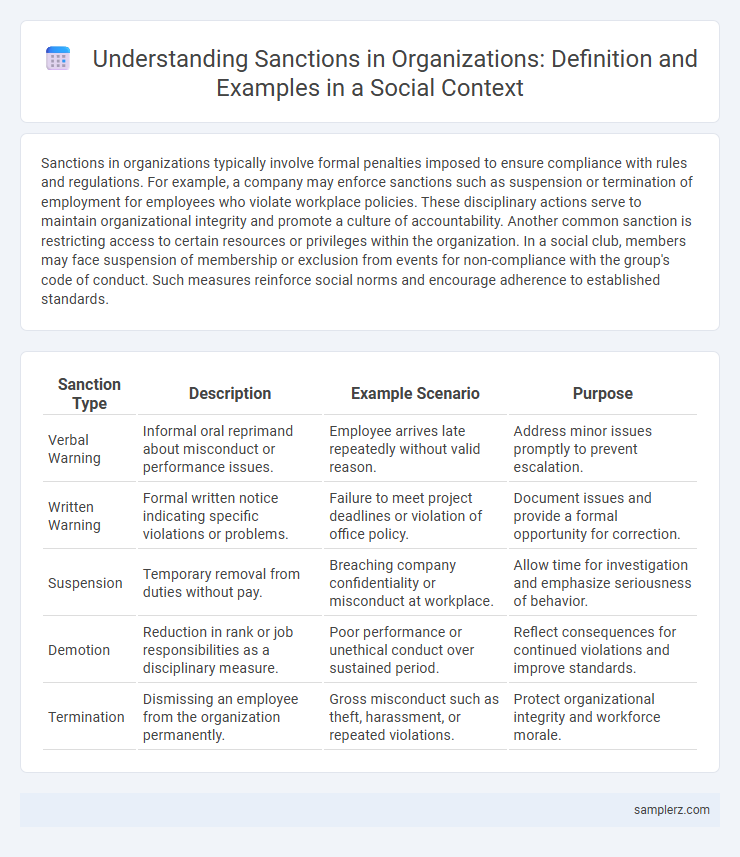Sanctions in organizations typically involve formal penalties imposed to ensure compliance with rules and regulations. For example, a company may enforce sanctions such as suspension or termination of employment for employees who violate workplace policies. These disciplinary actions serve to maintain organizational integrity and promote a culture of accountability. Another common sanction is restricting access to certain resources or privileges within the organization. In a social club, members may face suspension of membership or exclusion from events for non-compliance with the group's code of conduct. Such measures reinforce social norms and encourage adherence to established standards.
Table of Comparison
| Sanction Type | Description | Example Scenario | Purpose |
|---|---|---|---|
| Verbal Warning | Informal oral reprimand about misconduct or performance issues. | Employee arrives late repeatedly without valid reason. | Address minor issues promptly to prevent escalation. |
| Written Warning | Formal written notice indicating specific violations or problems. | Failure to meet project deadlines or violation of office policy. | Document issues and provide a formal opportunity for correction. |
| Suspension | Temporary removal from duties without pay. | Breaching company confidentiality or misconduct at workplace. | Allow time for investigation and emphasize seriousness of behavior. |
| Demotion | Reduction in rank or job responsibilities as a disciplinary measure. | Poor performance or unethical conduct over sustained period. | Reflect consequences for continued violations and improve standards. |
| Termination | Dismissing an employee from the organization permanently. | Gross misconduct such as theft, harassment, or repeated violations. | Protect organizational integrity and workforce morale. |
Types of Sanctions in Organizational Settings
Types of sanctions in organizational settings include formal penalties like suspension, demotion, and termination, as well as informal sanctions such as social exclusion or verbal warnings. Positive sanctions often involve rewards or recognition, enhancing employee motivation and compliance. Understanding these sanctions helps maintain workplace discipline and promote ethical behavior.
Case Study: Financial Sanctions in Corporations
Financial sanctions in corporations often involve freezing assets, restricting transactions, and prohibiting business with designated entities under national or international regulations. A notable case study is the violation of US Treasury sanctions by a multinational bank, resulting in hefty fines exceeding $1 billion and stringent compliance measures. These sanctions underscore the critical need for robust internal controls and continuous monitoring to mitigate risks linked to global financial compliance.
Common Behavioral Sanctions in the Workplace
Common behavioral sanctions in the workplace include verbal warnings, written reprimands, suspension, and termination, which serve to address violations of company policies or disruptive conduct. Progressive discipline systems often start with mild sanctions like counseling or performance improvement plans before escalating to more severe penalties. These sanctions aim to maintain organizational order, enhance employee accountability, and foster a productive work environment.
Performance-Based Sanctions: Examples and Impact
Performance-based sanctions in organizations include demotion, suspension, or withholding bonuses due to unmet targets or misconduct. These sanctions directly affect employee motivation, accountability, and overall productivity. Studies show that clearly communicated performance metrics linked to sanctions improve compliance and organizational efficiency.
Progressive Discipline: Step-by-Step Sanctioning
Progressive discipline in organizations enforces compliance through a step-by-step sanctioning process, starting with verbal warnings, progressing to written warnings, and escalating to suspension or termination if misconduct persists. This method helps correct employee behavior while maintaining fairness and transparency in the workplace. Documenting each disciplinary step ensures accountability and supports legal defensibility.
Social Sanctions in Team Dynamics
Social sanctions in team dynamics often manifest as informal penalties such as exclusion from group activities, reduced communication, or diminished support from peers. These sanctions reinforce organizational norms by discouraging behaviors that disrupt cohesion or productivity within the team. Consistent application of social sanctions helps maintain a collaborative environment and promotes mutual accountability among team members.
Legal Sanctions for Policy Violations
Organizations often impose legal sanctions such as fines, suspension, or termination for policy violations to ensure compliance and uphold ethical standards. Legal ramifications may include lawsuits or government penalties when employees breach regulatory requirements or internal codes of conduct. Enforcement of these sanctions strengthens organizational integrity and mitigates risks associated with non-compliance.
Ethical Sanctions in Professional Environments
Ethical sanctions in professional environments often include formal reprimands, suspension, or termination for violating codes of conduct such as confidentiality breaches or conflicts of interest. Organizations implement these sanctions to uphold integrity, promote accountability, and protect stakeholder trust. Consistent enforcement of ethical standards reinforces a culture of professionalism and responsibility within the workplace.
Informal Sanctions: Peer Pressure in Organizations
Informal sanctions in organizations often manifest through peer pressure, where colleagues subtly enforce social norms by expressing disapproval or withholding support when someone deviates from expected behaviors. This type of social control encourages conformity without formal disciplinary measures, fostering a collaborative work environment. Peer influence can significantly impact employee motivation, performance, and adherence to organizational culture.
Leadership Strategies for Implementing Sanctions
Leadership strategies for implementing sanctions in organizations emphasize clear communication of rules and consequences to ensure transparency and fairness. Effective leaders model accountability, fostering a culture where sanctions serve as corrective measures rather than punitive actions. Utilizing consistent enforcement and providing support for behavioral improvement enhances organizational trust and compliance.

example of sanction in organization Infographic
 samplerz.com
samplerz.com